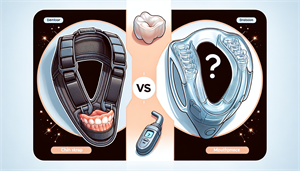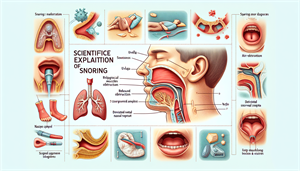
The Efficacy of Snoring Chin Strap vs Mouthpiece for Treating Sleep Disordered Breathing and Snoring
Snoring and sleep apnea can be more than just a nuisance. They can affect your quality of life, relationships, and even your health. Fortunately, numerous solutions are available to help you breathe easier and sleep better. Two popular options are chin straps and mouthpieces, but which one is right for you? In this blog post, we will dive into the world of snoring chin strap vs. mouthpiece, comparing their effectiveness, safety, and potential side effects. By the end, you will be equipped to make an informed decision on the best treatment option for your needs.
Understanding Chin Straps and Mouthpieces
Chin straps and mouthpieces are both utilized for the treatment of snoring and sleep apnea. These devices work differently, but they share a common goal: to improve your sleep quality by reducing snoring and sleep-disordered breathing. A snoring chin strap is a fabric strap that hooks on the chin with adjustable straps that secure around the head, while snoring mouthpieces are designed to reposition the jaw to facilitate improved airflow during sleep. Chin straps are generally crafted from a flexible fabric or neoprene-type material, and they serve the purpose of keeping the mouth closed to avoid snoring. On the other hand, snoring mouthpieces, also known as Mandibular Advancement Devices (MADs), prevent the mouth from falling open and reposition the jaw to improve airflow during sleep.
How Chin Straps Work
Chin straps are fabric straps designed to keep the mouth closed during sleep, thereby reducing mouth breathing and snoring caused by rapid flapping of soft tissues. Patients with obstructive sleep apnea may struggle to keep their mouth closed during positive airway pressure therapy. To address this issue, specialized mouth guards are used to help keep the mouth shut. By securing the mouth in a closed position during sleep, chin straps reduce the airflow-related vibrations that cause mouth breathing and snoring. However, numerous patients with snoring (but without sleep apnea) have attempted to use a chin strap without achieving the desired results.
How Mouthpieces Work
A Mandibular Advancement Device (MAD) is a mouthpiece for snoring that prevents the mouth from falling open while sleeping. By repositioning the jaw, MADs facilitate improved airflow during sleep and help reduce snoring and sleep apnea symptoms. The most effective MADs involve advancing the lower jaw to amplify the volume and size of the airway behind the tongue, while concurrently limiting the amount of mouth opening during sleep. Mouthpieces are generally safe when used correctly and with proper fit. However, temporary discomfort, excessive salivation, and jaw soreness may occur.
Effectiveness: Chin Strap vs Mouthpiece
When it comes to treating snoring and sleep-disordered breathing, mouthpieces have been proven more effective than chin straps for treating mild to moderate sleep apnea. However, both should be considered when creating a tailored treatment plan. Consult with a medical professional before use due to potential safety risks and side effects of these treatments as well as lifestyle modifications that may improve overall well-being.


